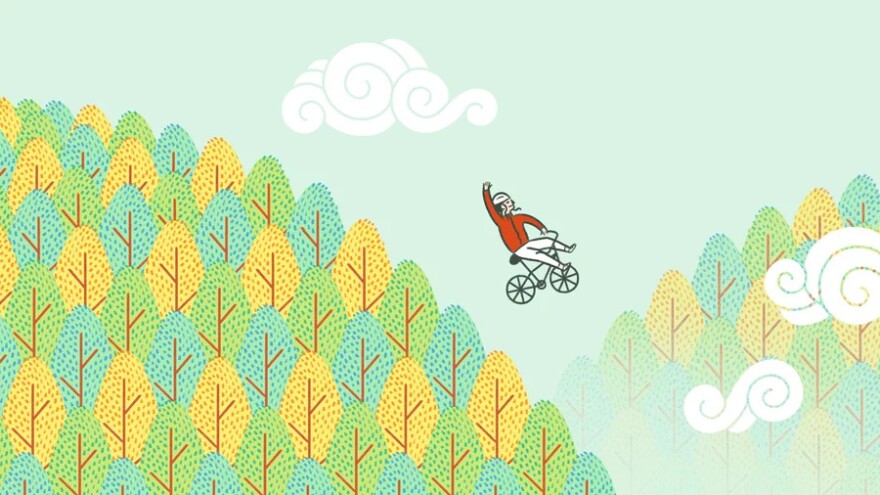This story is free to read because readers choose to support LAist. If you find value in independent local reporting, make a donation to power our newsroom today.
Just Like Life, Riding My Bike Doesn't Always Make Sense. But That's Why I Love It

I make the most and the least sense when I'm riding my bike.
It's one of the rare things in life that lets you escape from the world, while also connecting you to it. I love to spin my way through forests, around lakes, and into little communities I never knew existed.
Along the way, my brain disengages from stress. Life quiets down to simple rhythms. Problems seem to evaporate. Throw in a good podcast or music, and I'll be gone for hours.
On a nice long ride, you start finding new layers of yourself, new bursts of energy. That's when I feel like my body is actually incinerating little stresses and toxins I've accumulated.
Riding a bike is especially good for people like me, who have long-running knee problems. I'm missing a fairly important ligament in my left knee — a surgeon took it out on my 1st birthday, along with a tumor that had grown under my kneecap.
That meant I learned to walk in a full leg cast. One leg grew a little shorter than the other, making me self-conscious about the special shoes I wore. But on a bike, I was just like anyone else. And my doctor told me from an early age that riding a bike would build up muscles to help hold my knee together.
I've been able to do everything I've wanted to. But a clamor of "what-ifs" were often in the back of my mind, worried about a serious injury. Possibly to my detriment, I learned to turn the volume down on that noise, to block out what could go wrong.
It's a good strategy for life — focus on what you want to happen, not what you don't — but it's also something I think about when I ponder why I do the things I've done. And yes, this is where we get into the less-sensible stuff.
I acknowledge doing some crazy things on my bike. Passing a Camaro — in the left lane — on a steep hill in the dark. Riding through 8 inches of fresh snow on a 20-mile hill trail. Racing cars around traffic circles. Sprinting downhill, then coasting across a wide creek, legs straight out, hoping I have enough speed to carry me across the water.
In a way, it seems right that crazy things would happen on a bike, the most impossible of human conveyances. Everything else we use to get around makes absolute sense. But for years, scientists actually had no idea how or why a bicycle really works, on the most elemental levels.
My love for cycling started in high school, when I used money from a summer job to buy a Nishiki Century. Then I spent the next summer with my dad, riding a loaner Raleigh. I mainly worked at night. My dad worked in the day, so I rode for hours and hours.
By the time I returned to my hometown in South Carolina, I could easily ride out to the airport and back, buzzing up long highway hills and looping around the far side of the city to add miles. Without realizing it, I had become a cyclist. Within a few years, I was splayed out in the back of a friend's bike shop, rebuilding a planetary gear hub for a rusty Raleigh DL-1 I picked up for $5.
To learn more about bikes, I spent hours reading cycling guru Sheldon Brown, then Grant Petersen and Jan Heine. I watched the Tour de France, that spectacle of suffering. Like many others, I'm a fan of Jens Voigt, the German racer who famously told his own legs during a long, excruciating ride, "Shut up, legs!"
So far, my legs are holding out OK. I've put thousands of miles into my pea-green Surly Cross-Check and my titanium Merlin Extralight. I've routinely spurned happy hours in favor of a ride (yes, I was single for a looong time). And I embraced this circular logic: you ride to increase fitness — so you can ride more.
I came to enjoy little statistical feats. One of my favorites was to get off work and ride an 18-mile loop along the Potomac River into Maryland and back down into DC, all in one hour flat.
Later, I started pulling my daughters in a bike trailer, and the combined weight of about 100 pounds made me ponder torque and anaerobic exercise as I crept up hills. The trailer lets us be a one-car family, and it's great for bringing a picnic wherever we want to go.
The idea of being a "serious" cyclist still strikes me as a bit funny. After all, riding is fun. And when you're riding for fitness, it usually means you're using a very efficient machine not to get from point A to B, but just to ride around in a loop, with your feet spinning in circles. That's not to say I don't keep track of my average speed after a long ride, or my monthly mileage. Those stats are a way for me to compete with myself, and stay motivated.
I'm glad cycling has helped me stay healthy. But I love that it's given me a place to depressurize. Leaning over my handlebars, I've come to terms with setbacks and made plans for the future. It's where I realized I should propose to my wife. It's where I mourned my mother, after she died of ALS. And now it's where I think about my own kids.
The physics of bicycles may still be a mystery, but lots of things in life don't make sense. And they don't always have to. You've just got to keep moving.
Copyright 2022 NPR. To see more, visit npr.org.







